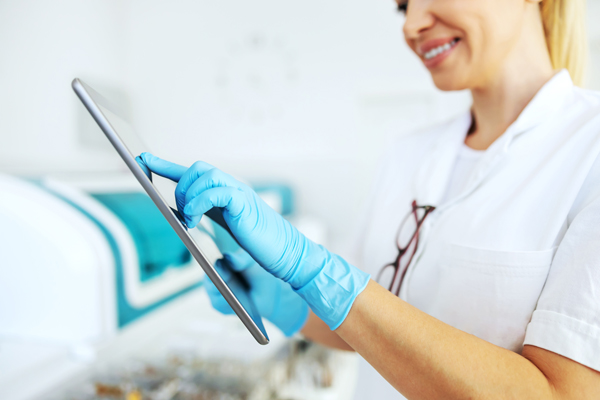In a past In Hand Dental blog, we shared a piece of news that many dental professionals may be unaware of – a resolution by the ADA puts a strong emphasis on the role dental professionals should be playing in the monitoring and treatment of sleep apnea.
You Owe it to Your Patients to Be a “First Responder”
You’re in the right place every time a dental patient is in your exam chair. As you focus on the teeth, tongue, gums, and general mouth health of your patients, it’s logical that you’re in a great position to also assess potential symptoms (mouth breathing, teeth clenching, etc.) associated with sleep apnea.
This focus is especially important for all patients with sleep apnea aged 50 -70, the age category most likely to receive an obstructive sleep apnea (OSA) diagnosis – but it’s especially critical for your male patients. Statistics show that men are two to four times more likely than women to have OSA – and being overweight for both men and women is also linked to a higher prevalence of OSA.
Menopause, hypothyroidism, family history of OSA, large tonsils, heart or kidney failure, and certain face and neck anatomy also put your patients at higher risk.
That said, it’s also important to keep in mind that sleep apnea can also affect your young patients. In fact, OSA occurs in 1% - 5% of children, most commonly between two and six years of age.
The question is, how can a dental professional become part of the first line of defense against sleep apnea?
Familiarize yourself with the signs and symptoms associated with sleep apnea. If you suspect there might be an issue; with one of your patients; or if you’ve been made aware of a diagnosis by a fellow provider, there are three immediate actions you can take.
Step One: Have a Frank Discussion with Your Patient
Your first action is to discuss your patient’s overall health and lifestyle. The questions below can help you assess your patient’s current condition. Keep in mind, the prevalence of “yes” answers, especially for your male patients with sleep apnea, can be a clear indication that further investigation into sleep apnea is needed:
- Are you under a physician’s care now for general health and/or sleep apnea?
- Are you over the age of 50?
- Is your neck size greater than 16 inches (female) or 17 inches (male)?
- Have you ever been hospitalized or had a major operation?
- Have you ever had a serious head or neck injury?
- Are you taking any medications, pills, or drugs?
- Have you ever taken Fosamax, Actonel or any other medications containing bisphosphonates?
- Do you feel tired, fatigued, or sleepy during the daytime?
- Has anyone observed you stop breathing during your sleep?
- Do you have your tonsils, or have you been told you have large tonsils?
- Do you have high blood pressure, or have you been treated for high blood pressure in the past?
- Is your BMI higher than 35? BMI Calculator.
- Do you use tobacco (including e-cigs) if so, what?
- Do you use controlled substances? If so, what?
- Do you consume alcohol? If yes, how many beverages per week?
- Have you ever had a sleep study or been told to get one? If so, when?
- Do you use a C-PAP or have been told to?
Step Two: Employ the In Hand Dental App to Ensure Compliance
Regular use of a C-PAP device or other OSA oral appliance is the first line of defense to protect someone diagnosed with OSA. But you as a dental professional can become an essential partner to a sleep physician by encouraging your patient to use the In Hand Dental app.
This remote monitoring app works off a smartphone and is the easiest, most convenient way for you and your colleagues to ensure that your patient is complying with their oral appliance therapy (OAT) protocol, and it also allows for real-time text and video communication with you and your staff should your patient have any questions or concerns, from anywhere, at any time.
Step Three: Request a Free In Hand Dental Demo to Learn More
To discuss how to incorporate the In Hand Dental app into your practice for your patients with sleep apnea, as well as for your clear aligner and braces patients, schedule a free private 30-minute demo today by calling In Hand Dental at (913) 701-7444 or completing the online request form.

